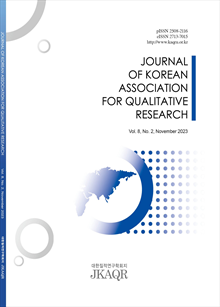간행물
대한질적연구학회지 KCI 등재 Korean Association for Qualitative Research

- 발행기관 대한질적연구학회
- 자료유형 학술지
- 간기 연3회
- ISSN 2508-2116 (Print)2713-7015 (Online)
- 수록기간 2016 ~ 2025
- 주제분류 의약학 > 기타의약학 의약학 분류의 다른 간행물
- 십진분류KDC 512DDC 610
권호리스트/논문검색
제9권 1호 (2024년 3월) 5건
1.
2024.03
구독 인증기관 무료, 개인회원 유료
Purpose: This study was conducted to assess the post-discharge experiences of caregiving mothers of pediatric patients with intestinal failure who were receiving home TPN treatment. Methods: This was a qualitative study utilizing Colaizzi’s phenomenological research method. The eight participants were mothers of pediatric outpatients from the short-gut syndrome clinic at a tertiary hospital in Seoul who were continuing home TPN treatment through a CVC. Data were collected from January to May 2022 through individual in-depth interviews, and analyzed. Results: Analysis of 127 meaningful statements from the mothers identified 12 themes and 36 sub-themes, organized into five categories: “Mixed emotions regarding hospital discharge”, “Problems after discharge”, “Stress in everyday life”, “Support from nurses and family members”, and “Looking to the future”. Conclusion: The study results provided insights into the meaning and value of the post-discharge experiences of mothers of pediatric patients with intestinal failure. These findings will be valuable in the development of interventions to provide education and other support measures for primary caregivers of children with intestinal failure.
4,600원
2.
2024.03
구독 인증기관 무료, 개인회원 유료
Purpose: This study aims to explore the in-depth experiences of participating in a parent education program at the H Science Institute and understand the meaning and essence of their experiences. Methods: This study employed qualitative content analysis. Data were collected from June 20 to 30, 2023. Participants were a total of 28 people who could provide detailed experiences of participation in the parent education program at the H Science Institute. Focus-group interviews were conducted with 28 participants. Results: The qualitative content analysis revealed six themes: “Exploring the genuine path to become a parent”, “Precious experiences acquired through education that is not easily accessible”, “Discovering the transformed self through education”, “I believe that there had been a change in family relationships”, “Improvements are required in a few contents”, and “I look forward to the program with more extended outreach”. Conclusion: Efforts are required to understand the current status of parent education, verify its empirical effectiveness, and provide parents with awareness of the necessity to observe and control their minds.
5,400원
3.
2024.03
구독 인증기관 무료, 개인회원 유료
Purpose: This study aimed to identify and describe the experiences of new nurses trained by clinical nursing educators. Methods: Data were collected through focus groups and in-depth interviews conducted between July 27 and August 12, 2021. The collected data was qualitatively analyzed through content analysis. Results: Six themes and 19 subthemes emerged. The themes included: “Worried about not adjusting to work”, “Not feeling at ease with the preceptor”, “Experiencing the benefits of working with the clinical nurse educator”, “Getting practical support from the clinical nurse educator”, “Receiving mental and emotional support from the clinical nurse educator”, and “Appreciating successful adjustment”. Conclusion: This study confirmed the importance of the educator’s role in helping new nurses adjust to the workplace and develop competence.
4,900원
4.
2024.03
구독 인증기관 무료, 개인회원 유료
Purpose: The study aim was to understand the experiences of intensive care unit (ICU) nurses in labor union activities. Methods: A descriptive qualitative study and content analysis were conducted. The participants included nine ICU nurses who shared their experiences with labor union activities. The data were collected through in-depth interviews. Results: The experiences of ICU nurses with labor union activities encompassed five themes: “The Initial Step in Union Activities”, “Benefits Derived from Union Participation”, “Concerns Regarding Union Activities”, “The Non-Omnipotence of Unions”, and “Achieving Mutual Benefits through Union Activities”. Conclusion: The study findings revealed that ICU nurses strive to improve their work and the nursing environment through labor unions, despite facing negative perceptions of union involvement.
4,800원
5.
2024.03
구독 인증기관 무료, 개인회원 유료
Purpose: This study aimed to identify and analyze the experience of passing and repealing the Nurses Act in Parliament. Methods: This qualitative study used content analysis. The data were collected through in-depth interviews October 16 to November 23, 2023. Results: The qualitative content analysis revealed five themes and 16 subthemes. The themes included: “Learning the Nurses Act through different channels”, “The Nurses Act’s passage, which strengthens the professionalism and legitimacy of the nursing profession”, “Looking back and feeling the joy and frustration of the process of getting it through the Congress and getting it repealed”, “An abandoned nursing practice due to bullying”, “Nevertheless, moving toward the re-enactment of the Nurses Act with hope”. Conclusion: Nurses expected the Nurses Act to recognize their expertise and clarify legal nursing practices; however, they were outraged and perplexed when the president vetoed the Nurses Act, and they felt sorry for the Nurses Act, which was turned into a political tool in the conflict between medical professions. Nevertheless, they hoped that the Nurses Act would be re-promoted through opinions and discussions with various professions and public awareness activities by developing nurses’ political capabilities and preparing a basis for the Nurses Act.
4,500원

